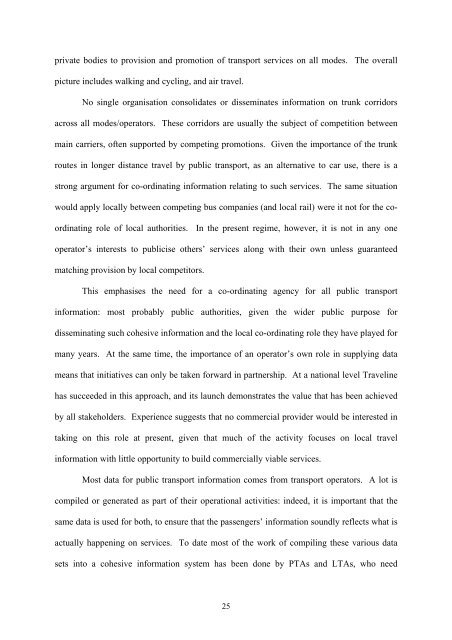Lyons, G. and Harman, R. (2002) The UK public transport indus- try ...
Lyons, G. and Harman, R. (2002) The UK public transport indus- try ...
Lyons, G. and Harman, R. (2002) The UK public transport indus- try ...
Create successful ePaper yourself
Turn your PDF publications into a flip-book with our unique Google optimized e-Paper software.
private bodies to provision <strong>and</strong> promotion of <strong>transport</strong> services on all modes. <strong>The</strong> overall<br />
picture includes walking <strong>and</strong> cycling, <strong>and</strong> air travel.<br />
No single organisation consolidates or disseminates information on trunk corridors<br />
across all modes/operators. <strong>The</strong>se corridors are usually the subject of competition between<br />
main carriers, often supported by competing promotions. Given the importance of the trunk<br />
routes in longer distance travel by <strong>public</strong> <strong>transport</strong>, as an alternative to car use, there is a<br />
strong argument for co-ordinating information relating to such services. <strong>The</strong> same situation<br />
would apply locally between competing bus companies (<strong>and</strong> local rail) were it not for the co-<br />
ordinating role of local authorities. In the present regime, however, it is not in any one<br />
operator’s interests to <strong>public</strong>ise others’ services along with their own unless guaranteed<br />
matching provision by local competitors.<br />
This emphasises the need for a co-ordinating agency for all <strong>public</strong> <strong>transport</strong><br />
information: most probably <strong>public</strong> authorities, given the wider <strong>public</strong> purpose for<br />
disseminating such cohesive information <strong>and</strong> the local co-ordinating role they have played for<br />
many years. At the same time, the importance of an operator’s own role in supplying data<br />
means that initiatives can only be taken forward in partnership. At a national level Traveline<br />
has succeeded in this approach, <strong>and</strong> its launch demonstrates the value that has been achieved<br />
by all stakeholders. Experience suggests that no commercial provider would be interested in<br />
taking on this role at present, given that much of the activity focuses on local travel<br />
information with little opportunity to build commercially viable services.<br />
Most data for <strong>public</strong> <strong>transport</strong> information comes from <strong>transport</strong> operators. A lot is<br />
compiled or generated as part of their operational activities: indeed, it is important that the<br />
same data is used for both, to ensure that the passengers’ information soundly reflects what is<br />
actually happening on services. To date most of the work of compiling these various data<br />
sets into a cohesive information system has been done by PTAs <strong>and</strong> LTAs, who need<br />
25

















